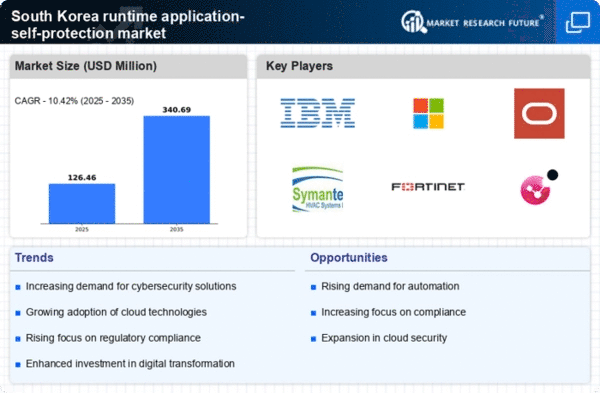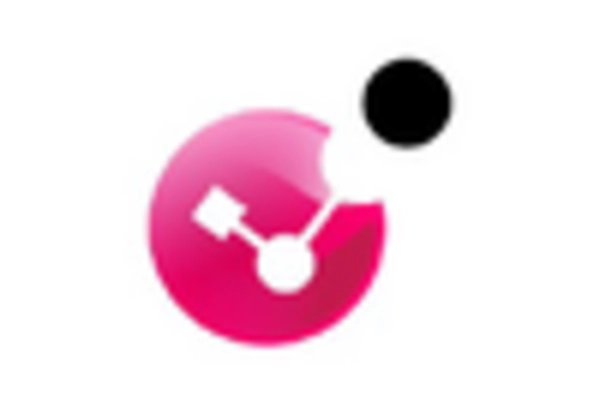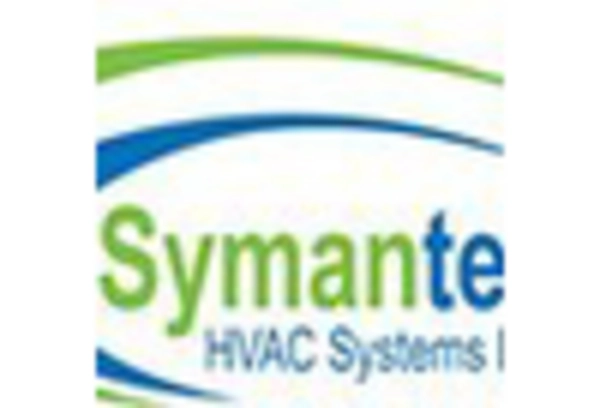Growing Regulatory Landscape
The evolving regulatory landscape in South Korea is significantly impacting the runtime application-self-protection market. With stringent data protection laws such as the Personal Information Protection Act (PIPA), organizations are compelled to adopt comprehensive security measures to ensure compliance. Non-compliance can result in hefty fines, which may reach up to 3% of annual revenue. As a result, businesses are increasingly investing in runtime application self-protection solutions to safeguard sensitive information and maintain compliance. The runtime application-self-protection market is thus likely to experience growth as companies prioritize regulatory adherence and seek to mitigate potential legal risks.
Rising Cybersecurity Threats
The runtime application-self-protection market is experiencing growth due to the increasing frequency and sophistication of cyber threats in South Korea. As organizations face a surge in ransomware attacks and data breaches, the need for robust security measures becomes paramount. In 2025, it is estimated that cybercrime could cost the global economy over $10 trillion annually, prompting South Korean enterprises to invest heavily in runtime application self-protection solutions. This market segment is expected to see a compound annual growth rate (CAGR) of approximately 15% as businesses prioritize the protection of sensitive data and applications. The runtime application-self-protection market is thus positioned to benefit from this heightened awareness and urgency surrounding cybersecurity.
Increased Awareness of Data Privacy
There is a growing awareness of data privacy among consumers and businesses in South Korea, which is influencing the runtime application-self-protection market. As individuals become more conscious of how their data is used and protected, organizations are compelled to implement stronger security measures. This trend is reflected in the rising demand for solutions that ensure data integrity and confidentiality. In 2025, it is estimated that 60% of South Korean consumers will prioritize data privacy when choosing service providers. Consequently, the runtime application-self-protection market is likely to benefit from this shift, as companies strive to enhance their security frameworks to meet consumer expectations.
Integration of Advanced Technologies
The integration of advanced technologies such as artificial intelligence (AI) and machine learning (ML) is driving the runtime application-self-protection market forward. These technologies enhance the ability of applications to detect and respond to threats in real-time, thereby improving overall security posture. In South Korea, the adoption of AI-driven security solutions is projected to grow by 20% in the next few years, as organizations seek to leverage automation for threat detection and response. The runtime application-self-protection market is likely to see increased demand for solutions that incorporate these technologies, as they provide a proactive approach to security, reducing the risk of successful attacks.
Shift Towards Digital Transformation
The ongoing digital transformation across various sectors in South Korea is a key driver for the runtime application-self-protection market. As organizations migrate to cloud-based environments and adopt digital solutions, the need for enhanced security measures becomes critical. In 2025, it is anticipated that over 70% of South Korean enterprises will have adopted cloud services, creating a fertile ground for runtime application self-protection solutions. This shift not only increases the attack surface but also necessitates robust security frameworks to protect applications in real-time. The runtime application-self-protection market is thus poised for growth as businesses seek to secure their digital assets amidst this transformation.

















